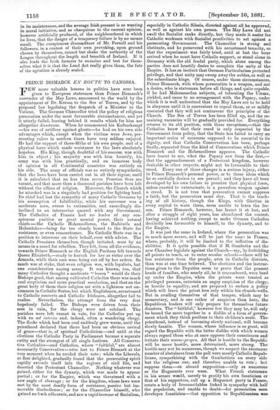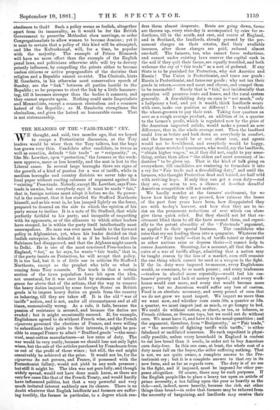PRINCE BISMARCK EN ROUTE TO CANOSSA. F EW more valuable lessons
in politics have ever been given to European statesmen than Prince Bismarck's surrender of the May Laws, announced to the world by the appointment of Dr. Korum to the See of Treves, and by the proposed law legalising the despatch of -a Minister to the Vatican. The German Chancellor tried the policy of religious persecution under the most favourable circumstances, and yet it utterly failed, leaving behind it results which for him are altogether disastrous. When he commenced his Kulturkampf —his war of artillery against ghosts—he had on his own side advantages which, except when the victims were Jews, per- secuting rulers in modern times have very seldom enjoyed. He had the support of three-fifths of his own people, and of a physical force which made resistance to the laws absolutely hopeless. His King, though doubtful of his success, was with him in object ; his majority was with him heartily, his army was with him practically, and an immense body of opinion in all Continental countries was entirely on his side. The army of officials was so entirely sympathetic, that the laws have been carried out in all their rigour, until it is calculated that no less than seven Prussian Sees are vacant, and that more than a thousand parishes have been left without the offices of religion. Moreover, the Church which he attacked was in a singularly bad position for fighting hard. Its chief had lost the sympathy of many Catholic Germans by his assumption of Infallibility, while his successor was a moderate man, averse to extremities, and exceedingly dis- inclined to an internecine quarrel with any Government. The Catholics of Prussia had no leader of any con- spicuous position or great mental power, their natural chiefs—the Catholic Hohenzollems, the Radziwils and Hohenlohes—being far too closely bound to the State for resistance, or even remonstrance. No Catholic State was in a position to intervene on their behalf, even with advice. The Catholic Prussians themselves, though irritated, were by no means in a mood for rebellion. They felt, from all the evidence, towards Prince Bismarck as the English Puritans felt towards Queen Elizabeth,—ready to hurrah for her as victor over the Armada, while their ears were being cut off by her orders. So much was at stake, that even religion was, with loyalists, but one consideration among many. It was known, too, that many Catholics thought a moderate " lesson " would do their Bishops good, that among cultivated Catholics there was much cool scepticism and more practical secularism, and that on the great body of them their religion sat with a lightness not un- common in Catholic States, but which Englishmen, accustomed to Catholic converts and Catholic Irishmen, altogether fail to realise. Nevertheless, the attempt from the very first hopelessly failed. The Bishops were driven from their sees in vain, for the clergy were not subdued. The parishes were left vacant in vain, for the Catholics put up with an ad interim and, indeed, often a wandering clergy. The flocks which had been cool suddenly grew warm, until the priesthood declared that there bad been an obvious revival of grace—that is, of spiritual Catholicism—and until at the elections the Catholic Party in Parliament became a separate entity and the strongest of all single factions. All Conserva- tive Catholics—and Catholics, where " faithful," are almost necessarily Conservative—were lost to Prince Bismark at the very moment when he needed their vote ; while the Liberals, at first delighted, gradually found that the persecuting spirit rapidly extends itself into the regions of civil life, and deserted the Protestant Chancellor. Nothing whatever was gained, either for the dynasty, which was made to appear partial ; or for the Empire, which was threatened with a new angle of cleavage ; or for the kingdom, whose laws were met by the most deadly form of resistance, passive but im- movable disobedience ; or for the Chancellor himself, who gamed no ft esh adherents, and saw a rapid increase of Socialism,
especially in Catholic Silesia, directed against all he approved, as well as against his own person. The May Laws did not swell the Socialist ranks directly, but they made it easier for Catholic workmen with Socialist proclivities to act against a, persecuting Government. The Chancellor is strong and obstinate, and he persevered with his accustomed tenacity, so that the experiment was fairly tried, until at last the hour arrived when he must have Catholic support, or stand alone in Germany with the old feudal party, which alone among the parties does not heartily desire to complete the unity of the- Empire. It has an instinct that German Particularism protected privilege, and that unity may sweep away the nobles, as well as the subordinate kings. Of course, under those circumstances, Prince Bismarck, with whom persecution is a weapon, and not a desire, who is statesman before all things, and quite capable, if he had Mehommedan subjects, of tolerating the Ulema, yielded, and came to an arrangement with the Papacy, under which it is well understood that the May Laws are to be held in abeyance until it is convenient to repeal them, or so mildly executed that they will not contravene the principles of the Church. The See of Treves has been filled up, and the re- maining vacancies will be gradually provided for. Everything returns to its old position, with these exceptions,—that the Catholics know that their creed is only respected by the Government from policy, that the State has failed to carry an important series of measures supposed to be essential to its dignity, and that Catholic Conservatism has been, perhaps finally, separated from the kind of Conservatism which Prince Bismarck and the Hohenzollerns approve. The Catholic have learnt to see, what the Papacy saw from the first,— that the aggrandisement of a Protestant kingdom, however desirable in other respects, might not be favourable to their creed. Every one of those changes is a serious injury, either to Prince Bismarck's personal power, or to those ideas which he so cordially desires to see prevail ; and they have all been developed by his own failure to perceive that physical force, unless exerted to exterminate, is a powerless weapon against a creed. It is not true that persecution cannot suppress. a faith, but the persecutors must slay. That is the teach- ing of all history, though the Kings, with Ghettos in every capital to warn them, seem unable to learn the les- son. Prince Bismarck, however, has learnt it at last, and after a struggle of eight years, has abandoned the contest, having achieved nothing, except to make German Catholics decidedly less favourable to himself, to the dynasty, and to the Empire.
It was just the same in Ireland, where the persecution was so much more severe, and will be just the sam in France, where, probably, it will be limited to the infliction of dis- abilities. It is quite possible that if M. Gambetta and the new Chamber legislate against the Church—say, by forbidding all priests to teach, or to enter secular schools—there will be less resistance -from the people, even in Catholic districts, than was at one time believed. The elections and the instruc- tions given to the Deputies seem to prove that the peasant heads of families, who nearly all, be it remembered, were bred up under the Empire, when the priests were treated as privileged persons, entertain an angry suspicion of the clergy, as hostile to equality, and are prepared to endure a policy which will leave the priest free only within his church-walls. But in availing themselves of that temper, which may be momentary, and is one rather of suspicion than hate, the Republican leaders will only prepare for themselves future disasters. The "faithful," however few they may be, will only be bound the more together in a dislike of a form of govern- ment which they think perilous to their children's souls. The- priesthood, instead of becoming slowly national, will become slowly fanatic. The women, whose influence is so great, will regard the Republic with the bitter dislike with which women always regard those who at once oppress their consciences and irritate their amour-propre. All that is hostile to the Republic will be more hostile, more determined, more strong. The hostile may not be numerous, though we suspect the enormous number of abstainers from the poll were mostly Catholic Repub- licans, sympathising with the Gambettists on every side but the religious one, and therefore unable to vote ; but suppose them—an absurd supposition—only as numerous- as the Huguenots ever were. What French statesman in his senses would, merely to gratify his own fanaticism or that of his supporters, call up a Huguenot party in France, create a body of Irreconcilables linked in sympathy with half the population, and unable to doubt—for persecution soon developes fanaticism—that opposition to Republicanism was obedience to God? Such a policy seems as foolish, altogether apart from its immorality, as it would be for the British Government to proscribe Methodist class meetings, or order Congregationalists to allow women to become deacons ; yet it is next to certain that a policy of this kind will be attempted, and like the Kulturkampf, will, for a time, be popular with the majority. The example of Prince Bismarck will have no more effect than the example of the English penal laws, and politicians otherwise able will try to destroy priestly influence, by compelling the priests either to become useless citizens or active propagandists of the doctrine that religion and a Republic cannot co-exist. The Clericals, hints M. Gambetta, in his otherwise most conservative speech of Sunday, are the " link " between all parties hostile to the Republic ; so he proposes to rivet the link by a little hammer- ing, till it becomes stronger than the bodies it connects, and they cannot separate again. Nothing could unite Imperialists and Monarchists, except a common clericalism and a common hatred of the Republic ; so M. Gambetta strengthens the clericalism, and gives the hatred an honourable cause. That is not statesmanship.































 Previous page
Previous page